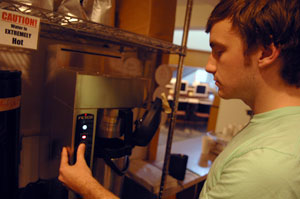|
||
      |
Coffee in Crerar
Cling, cling, cling. Behind a closed gate in Crerar Library’s basement USITE computer lab, coins drop into a register. Rising third-year Jonathan Cannon counts the money before lifting the gate and thus opening the campus’s newest coffee shop for the evening. Open Sunday–Thursday evenings, Brew occupies the Plum Café’s former location and serves Crerar’s all-night study space, which replaced the Regenstein’s all-night space this past academic year.

Neal Curley, ’09, brews Metropolis coffee in Crerar Library’s new shop.
“From 5 to 9 it’s dead,” says Cannon, one of Brew’s assistant managers, who moved there after working at the Reg’s Ex Libris. “At night it’s gotten busier. During midterms it was real busy.” The other staffer for the night, Neal Curley, ’09, makes Metropolis coffee in one of the shop’s large vats. Behind him sit boxes of Cliff bars, granola bars, M&Ms, and Twizzlers; packets of chamomile and green, black currant, ceylon, and English tea; and a fridge stacked with prepared meals from Cedars, Rajun Cajun, and University Market, as well as Coke, Diet Coke, Sierra Mist, and Red Bull.
The shop’s best seller, though, is coffee. The University’s new vendor, Metropolis, a fair-trade, organic roaster on Chicago’s North Side, has sold about ten percent better than its predecessor, says Stacey Brown, the University’s coffee-shop coordinator. Brown, on the Office of the Reynolds Club and Student Activities staff since December, helps student managers run the Cobb coffee shop, the Regenstein’s Ex Libris, Hallowed Grounds in the Reynolds Club, and now Brew. The shops, she says, “are self-sustaining, fully functioning retail stores” that pay their own labor costs—75 or 80 student workers. Each location grosses about $300,000 a year (though in June Brown hadn’t yet calculated Brew’s figures). “It’s a great learning opportunity for students to run a business at age 22.”
The new Brew—named in a student vote—has yet to percolate an identity the way the others have: Cobb with its loud music and hipster vibe, Hallowed Grounds where baristas play pool after shifts and turn on the latest music, and Ex Libris where the assistant manager blasts dance music and, Brown says, “we joke no one ever leaves.” Most of Brew’s staff comes from Hallowed Grounds, a factor that might influence its eventual feel. Cannon has already begun “playing really annoying music” like polka, he says, while another coworker plays black metal. Because the Crerar space had been calmer, he says, “we play it softly here.”
Spring quarter was a test for Brew, and it passed. In June the Office of Student Life decided to reopen the shop this fall. “If you’re going to move the all-night study space,” Brown says, “you need more than one vending machine in the basement.”
Students like Cannon and Curley, meanwhile, man the basement counter—and drink plenty of coffee. “I’ve cut back to three cups a day,” Cannon says. While Brown says he’s paid at a rate “competitive” with other campus jobs, during his shifts Cannon puts out a tip jar to split with the staff. The paper coffee cup next to the register sports a hand-written sign: “I am a tip cup. Please put tips in me! (Remember about karma and all that stuff!).” Every bit helps.